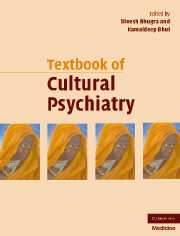Book contents
- Frontmatter
- Contents
- Contributors
- Foreword
- Preface
- Part I Theoretical background
- Part II Culture and mental health
- Part III Culture and mental disorders
- Part IV Theoretical aspects of management
- 26 Traumascape: an ecological–cultural–historical model for extreme stress
- 27 Sexual dysfunction across cultures
- 28 Therapist–patient interactions and expectations
- 29 Developing mental-health services for multicultural societies
- 30 Psychopharmacology across cultures
- 31 Psychotherapy across cultures
- 32 Psychological interventions and assessments
- 33 Spiritual aspects of management
- 34 Cultural aspects of suicide
- Part V Management with special groups
- Part VI Cultural research and training
- Cultural psychiatry: the past and the future
- Index
- References
31 - Psychotherapy across cultures
from Part IV - Theoretical aspects of management
Published online by Cambridge University Press: 11 August 2009
- Frontmatter
- Contents
- Contributors
- Foreword
- Preface
- Part I Theoretical background
- Part II Culture and mental health
- Part III Culture and mental disorders
- Part IV Theoretical aspects of management
- 26 Traumascape: an ecological–cultural–historical model for extreme stress
- 27 Sexual dysfunction across cultures
- 28 Therapist–patient interactions and expectations
- 29 Developing mental-health services for multicultural societies
- 30 Psychopharmacology across cultures
- 31 Psychotherapy across cultures
- 32 Psychological interventions and assessments
- 33 Spiritual aspects of management
- 34 Cultural aspects of suicide
- Part V Management with special groups
- Part VI Cultural research and training
- Cultural psychiatry: the past and the future
- Index
- References
Summary
EDITORS' INTRODUCTION
Psychotherapy has been a major part of therapeutic armentatrium in managing patients with mental illness. Often seen as a product of Western Eurocentric tradition, it is argued that not all psychotherapies are suitable for all cultural groups. Cultural norms of different psychotherapeutic interventions are often indigenous but these get ignored when groups move to other cultures. Tantam in this chapter emphasizes that there are clear ethnic and cultural values that are important in determining therapeutic needs and interventions. A person is immersed in a culture but is consigned to a class or ethnic group. Members of a class have specified status, social influence, health and opportunities for wealth creation. Ethnicity and religion are related to organizing principles of status in society. Western psychotherapists and psychotherapy draw on two cultural traditions which are intertwined within Western psychotherapists, and psychotherapy draws on two cultural traditions which are intertwined within Western European thought. The success of causal explanations in aetiology and in therapy has secured their pre-eminence. Personal identity is a common issue in psychotherapy and this varies across cultures as do the concepts of self. Tantam emphasizes that cultural values are affect laden, which must be taken into account in any intervention. Provision of psychotherapy across cultures means that the therapist not only has to deal with unfamiliarity and uncertainty created by novel ideas or situations, but also means dealing with the emotional flavour of the novelties. This will be further affected by the way in which culture transmits emotional flavours.
- Type
- Chapter
- Information
- Textbook of Cultural Psychiatry , pp. 414 - 423Publisher: Cambridge University PressPrint publication year: 2007
References
- 1
- Cited by



